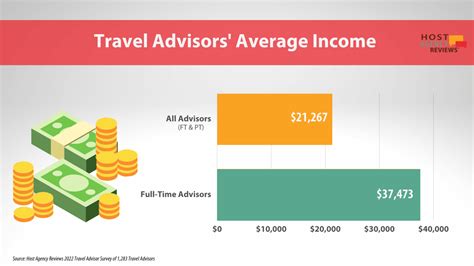Are you considering a career as a travel agent and wondering about the potential earnings in this profession? In this blog post, we will provide you with valuable insights into the salaries of travel professionals. From the factors that affect travel agent salaries to the impact of experience and specializations on earnings, we will cover it all. We will also discuss the average salary range for travel agents, incentives and bonuses they may receive, as well as regional variations in salaries. Additionally, we will explore the different types of travel agencies and how they may impact earning potential. Whether you’re interested in the education and training needed for this career or the future outlook for travel agent salaries, this post will give you a comprehensive overview of what to expect in terms of compensation as a travel agent. So, if you’re curious about the salary packages and benefits offered in this field, keep reading to learn more.
Table of Contents
Factors Affecting Travel Agent Salaries
When considering a career as a travel agent, it’s important to understand the various factors that can affect your potential salary. These factors can range from the type of agency you work for to your level of experience in the industry. Understanding these key elements can help you make informed decisions about your career and potential earning potential.
One important factor that can affect travel agent salaries is the type of agency you work for. Different types of agencies, such as online travel agencies, corporate travel agencies, and leisure travel agencies, may offer different salary structures and earning potential. It’s important to research and understand the salary ranges for each type of agency before making a decision about where to pursue a career as a travel agent.
Another key factor that can impact travel agent salaries is the level of experience and training you have in the industry. As with many professions, travel agents with more experience and specialized training may be able to command higher salaries. This can include additional certifications, such as becoming a Certified Travel Associate or Certified Travel Counselor, which can demonstrate your expertise and dedication to the field.
Additionally, regional variations can also impact travel agent salaries. The cost of living and demand for travel agents can vary significantly by location, leading to differences in salary potential. It’s important to consider these regional differences when evaluating potential career opportunities and salary expectations as a travel agent.
Education and Training for Travel Agents
Education and training are crucial for anyone looking to start a career as a travel agent. The job requires a deep understanding of destinations, travel regulations, and customer service, all of which can be obtained through the right educational background and training programs.
Many travel agencies prefer candidates with a degree in hospitality management, travel and tourism, or a related field. These programs provide students with a solid foundation in the industry, covering topics such as travel economics, marketing, and business management.
In addition to formal education, aspiring travel agents can benefit from specialized training programs. These may include courses on specific software tools used in the industry, destination knowledge, and customer relationship management. Some employers even offer on-the-job training to ensure that their agents are well-equipped to handle the demands of the role.
Continuous education is also important for travel agents to stay updated on the latest travel trends, regulations, and technologies. Many professionals in the industry attend workshops, conferences, and online courses to enhance their skills and knowledge, ultimately making them more competitive in the market.
Average Salary Range for Travel Agents
When considering a career as a travel agent, it’s important to understand the potential salary range that comes with the job. The average salary range for travel agents can vary depending on a number of factors, including experience, location, and the type of travel agency they work for. According to the Bureau of Labor Statistics, the median annual wage for travel agents was $40,660 in May 2020. However, it’s important to note that this figure can vary significantly based on individual circumstances.
Experience plays a significant role in determining a travel agent’s salary range. Those with little to no experience in the industry can expect to earn at the lower end of the salary range, while those with several years of experience and a strong client base may earn salaries at the higher end. Additionally, the type of travel agency a travel agent works for can impact their salary. For example, those working for large, well-established agencies may earn higher salaries than those working for smaller, independent agencies.
Location is another important factor to consider when discussing the average salary range for travel agents. Travel agents in high-cost-of-living areas such as New York City or San Francisco may earn higher salaries to offset the higher cost of living, while those in smaller, more rural areas may earn lower salaries. Regional variations in salaries are an important consideration for those pursuing a career in this field.
In conclusion, the average salary range for travel agents is influenced by a variety of factors, including experience, location, and the type of agency they work for. While the median annual wage provides a general idea of what travel agents can expect to earn, it’s important to consider these other factors when determining potential salary ranges.
Salaries in Different Travel Agency Types
When it comes to the salaries of travel agents, the type of agency they work for can have a significant impact. Corporate travel agencies often offer higher salaries compared to online travel agencies or independent travel agencies. This is because corporate agencies usually handle high-value business and first-class bookings, which result in higher commission rates and salary levels for their agents.
On the other hand, online travel agencies typically have lower overhead costs and can afford to offer lower salaries compared to their corporate counterparts. However, they may make up for this with performance-based bonuses and commission structures. Independent travel agencies may also offer lower base salaries, but some agents prefer this type of agency as they have more flexibility in setting their own hours and client base.
It’s important for aspiring travel agents to consider the type of agency they want to work for and how it may impact their potential salary. Each agency type offers its own set of perks and challenges, so it’s essential to weigh these factors before deciding on the best fit.
Overall, the salaries in different travel agency types can vary significantly, and agents should research the specific agency they are interested in to gain a better understanding of the potential earnings and benefits.
Incentives and Bonuses for Travel Agents
One of the key factors that can impact the overall salary package for travel agents is the incentives and bonuses they receive. In addition to the base salary, many travel agencies offer performance-based incentives and bonuses to their agents as a way to motivate and reward them for their hard work.
These incentives and bonuses can come in various forms, such as sales commissions, travel discounts, free trips, or even cash bonuses. Travel agents who are able to meet or exceed their sales targets are often eligible for these additional rewards, which can significantly boost their overall earnings.
Furthermore, some travel agencies also offer special incentives for promoting certain travel packages or destinations, allowing agents to earn additional bonuses for selling specific products. These additional perks can serve as a strong motivator for travel agents to increase their sales efforts and drive business for their agency.
Overall, the incentives and bonuses offered by travel agencies can have a substantial impact on the total earnings of travel agents, making it an important consideration for those pursuing a career in the travel industry.
Regional Variations in Travel Agent Salaries
When it comes to the earnings of travel agents, one important factor to consider is the regional variations in salaries. Travel agents working in different areas often experience differences in their compensation due to various factors such as the cost of living, demand for travel services, and local economic conditions.
For example, travel agents in major metropolitan areas may receive higher salaries compared to those working in smaller towns or rural areas. This is often attributed to the higher cost of living in cities, as well as the greater number of potential clients and travel opportunities.
In addition to location, the type of travel agency also plays a role in determining regional variations in salaries. For instance, agents employed by luxury travel agencies in upscale urban areas may command higher earnings compared to those working for budget travel companies in less affluent regions.
Understanding these regional variations is essential for both aspiring travel agents and those already in the industry. It can help individuals make informed decisions about where to pursue their careers and what types of agencies to target for optimal earning potential.
Impact of Experience on Travel Agent Earnings
Experience plays a crucial role in determining the earnings of a travel agent. As travel agents gain more experience in the industry, they acquire a deeper understanding of the market trends, customer preferences, and negotiation skills, which directly impact their ability to generate higher sales and commissions.
With experience comes the opportunity to build a solid client base and establish long-term relationships, leading to a steady stream of repeat business and referrals. But it’s not just about attracting more clients; experienced travel agents are also better equipped to handle complex travel itineraries, manage unforeseen challenges, and provide personalized recommendations that meet the specific needs of their clients.
Moreover, seasoned travel agents often have access to a wider network of suppliers, airlines, hotels, and tour operators, enabling them to secure better deals and exclusive perks for their clients. This not only enhances the value proposition of their services but also results in higher earnings through increased commissions and bonuses.
Overall, the impact of experience on a travel agent’s earnings is undeniable, as it directly influences their sales performance, client retention, and access to lucrative opportunities within the industry.
Travel Agent Salary Packages and Benefits
When considering a career as a travel agent, it’s important to take into account the salary packages and benefits that come with the job. Travel agents can expect to receive a variety of incentives and bonuses in addition to their base salary, making the total compensation package quite attractive.
One of the main benefits of working as a travel agent is the opportunity to earn commission on sales. This commission can vary depending on the type of travel agency and the volume of sales, but it can be a significant source of additional income for agents who excel at selling travel packages.
In addition to commission, many travel agencies offer their agents travel discounts and complimentary trips. This not only provides agents with the opportunity to experience the destinations they are selling to customers, but also allows them to supplement their income by participating in familiarization trips and other travel perks.
Furthermore, travel agents may have access to health insurance, retirement plans, and other benefits commonly offered by employers. This can add to the overall compensation package and make working as a travel agent even more financially rewarding.
Specializations and Its Effect on Salaries
Specializing in a specific area of travel can have a significant impact on a travel agent’s salary. By focusing on a niche market such as luxury travel, adventure travel, or corporate travel, agents can command higher salaries due to their expertise and specialized knowledge. This expertise allows them to provide personalized, tailored experiences for their clients, leading to higher commission rates and bonuses.
Furthermore, travel agents who specialize in certain destinations or types of travel, such as cruises or safaris, may also benefit from higher earnings. Clients seeking these specific experiences often value the expertise and insider knowledge that a specialized agent can provide. As a result, these agents can charge premium fees for their services, thus increasing their overall salary.
On the other hand, general travel agents who cater to a wide range of destinations and travel types may face more competition and lower commission rates, leading to lower overall salaries. However, specializing in a niche area requires continuous education and training to stay updated with the latest trends and developments in that specific market, ensuring that the agent remains competitive and knowledgeable in their field.
In conclusion, specializing in a specific area of travel can have a significant impact on a travel agent’s salary. This specialized knowledge allows agents to provide personalized experiences, leading to higher commission rates and fees. However, this also requires continuous education and training to stay competitive in their niche market.
Future Outlook for Travel Agent Salaries
Technology advancements are changing the way travel agents operate and this has a significant impact on their future salaries. As more travel planning and booking processes move online, traditional travel agencies may see a decline in demand for their services, potentially affecting the earnings of travel agents. On the other hand, there is also the potential for new technology to create opportunities for travel agents to specialize in niche areas and provide unique services, which could lead to higher income.
Another factor that will play a role in the future salaries of travel agents is the evolving travel industry. As consumer preferences and travel trends change, travel agents will need to adapt and expand their knowledge and skills to remain competitive. Agents who can keep up with the latest travel trends and offer personalized, high-value services will likely be able to demand higher compensation. However, those who fail to keep pace with industry changes may see their salaries stagnate or decline.
Economic factors also contribute to the future outlook for travel agent salaries. As the global economy continues to fluctuate, so too will the demand for travel services. Travel agents who can navigate economic uncertainties and effectively manage their business will be better positioned to maintain or increase their income. Additionally, the impact of economic conditions on leisure and corporate travel will directly affect the earnings potential of travel agents.
Overall, the future outlook for travel agent salaries is not entirely predictable, but by staying informed about industry changes, embracing technology, and providing high-quality personalized services, travel agents can position themselves for financial success in the years to come.






